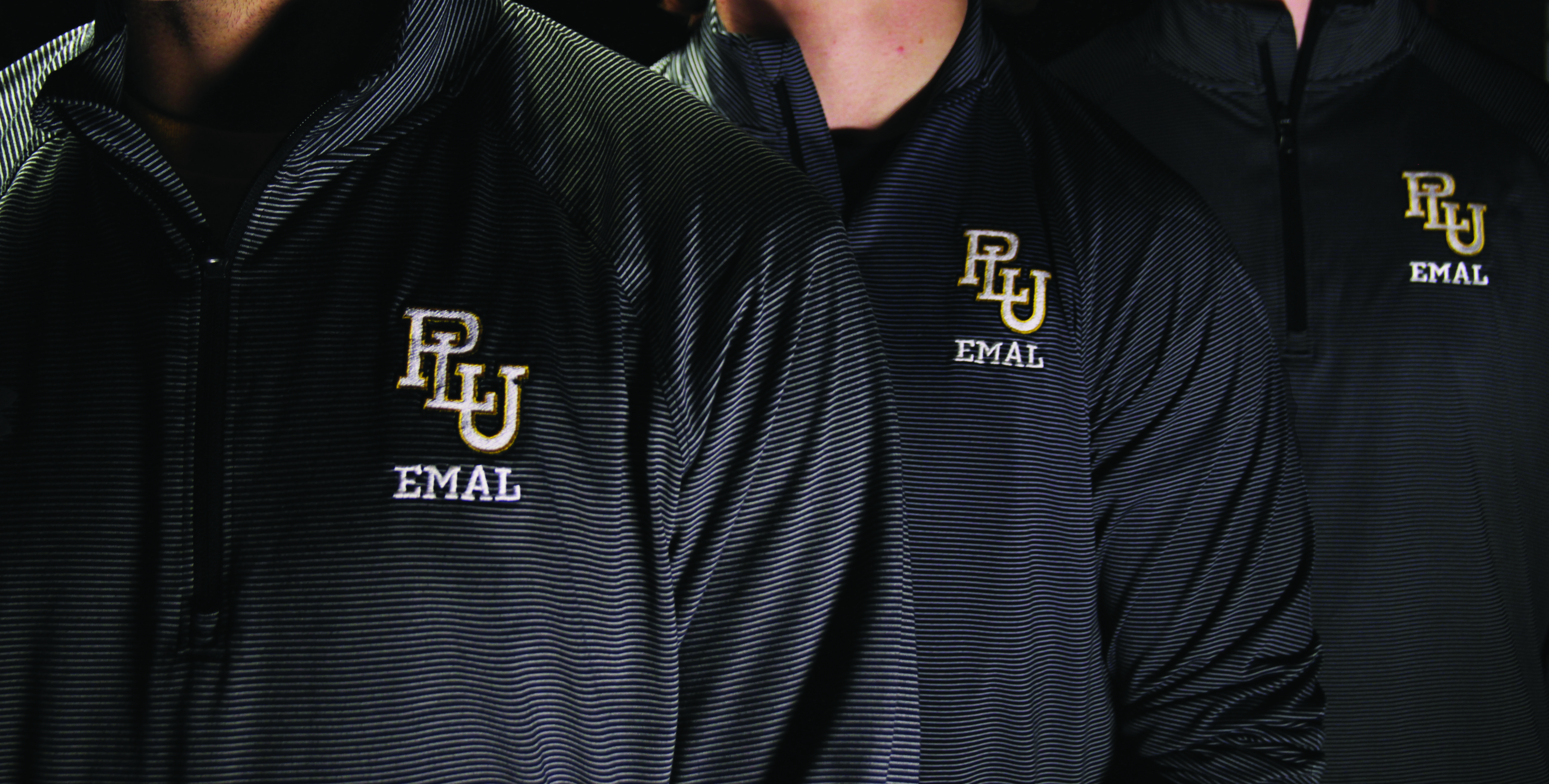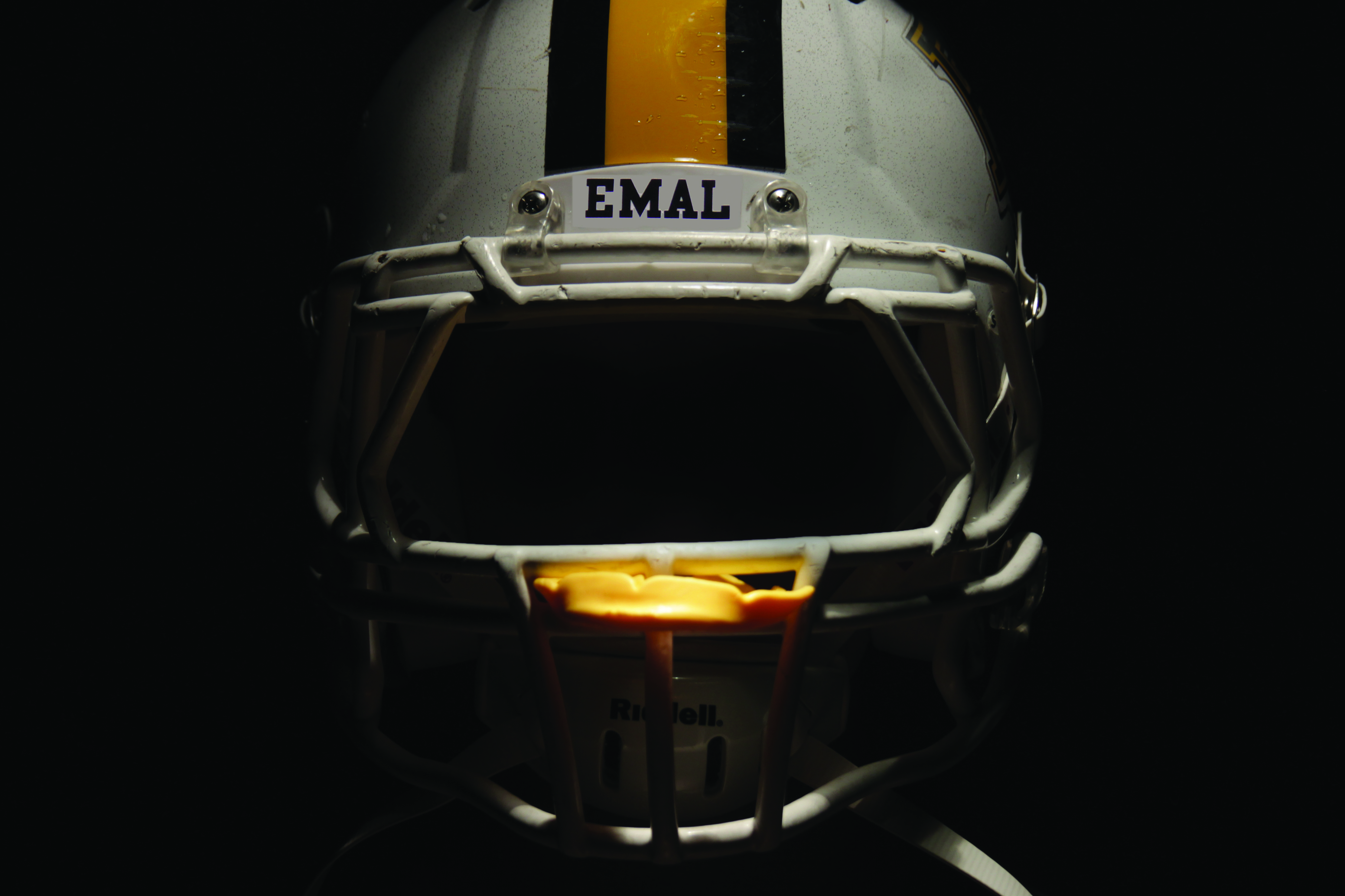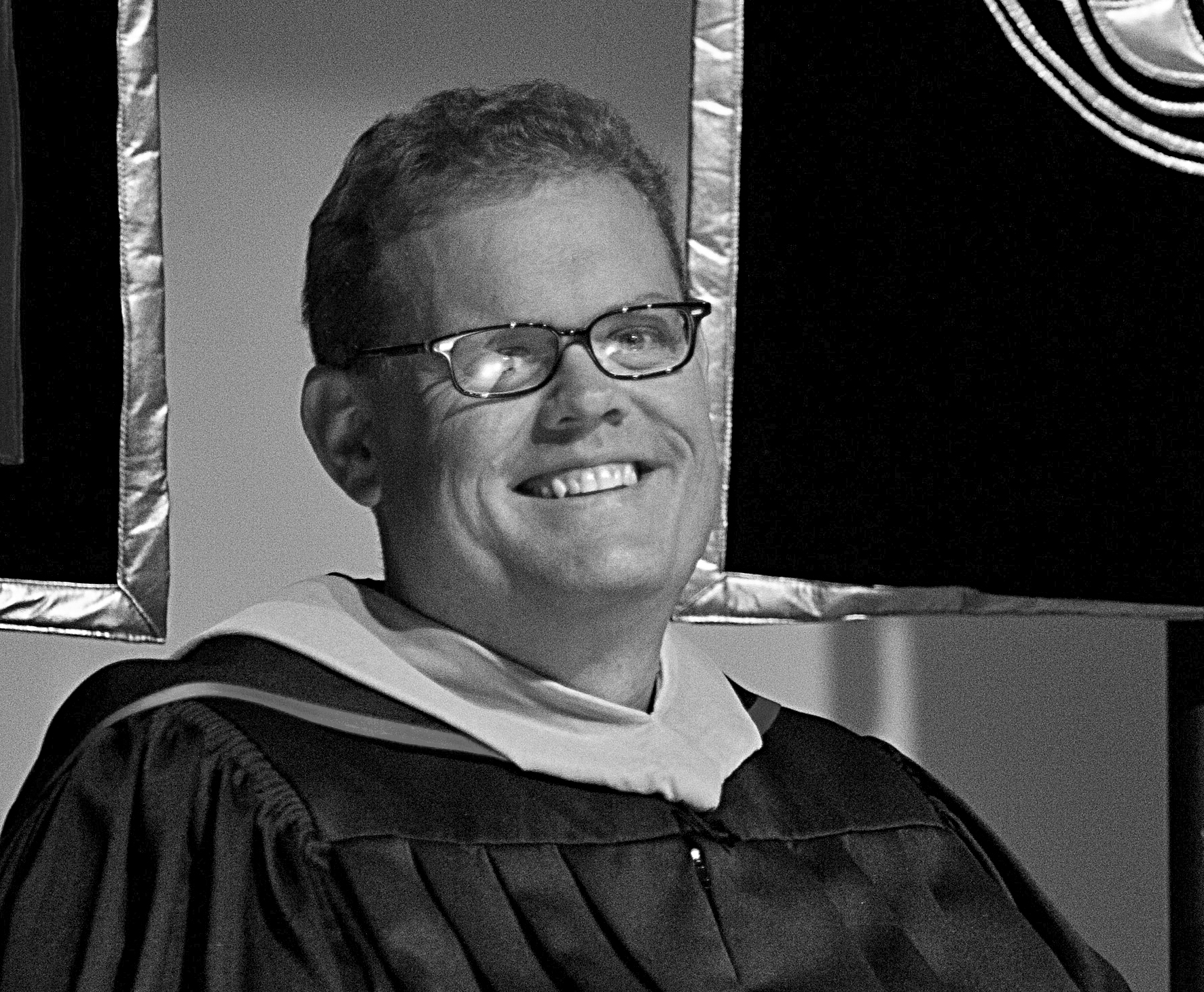Feel strongly about our article? Write us a Letter to the Editor: https://mastmedia.plu.edu/contactus/write-a-letter-to-the-editor/
MAST STAFF ; mast@plu.edu
When the Pacific Lutheran University Department of Athletics tweeted a photo (pictured below) supporting the Bjug Harstad Day of Giving Oct. 10, the post garnered immediate response. The tweet included a photo of a football player wearing a paper Bjug Harstad beard and a PLU football practice jersey.
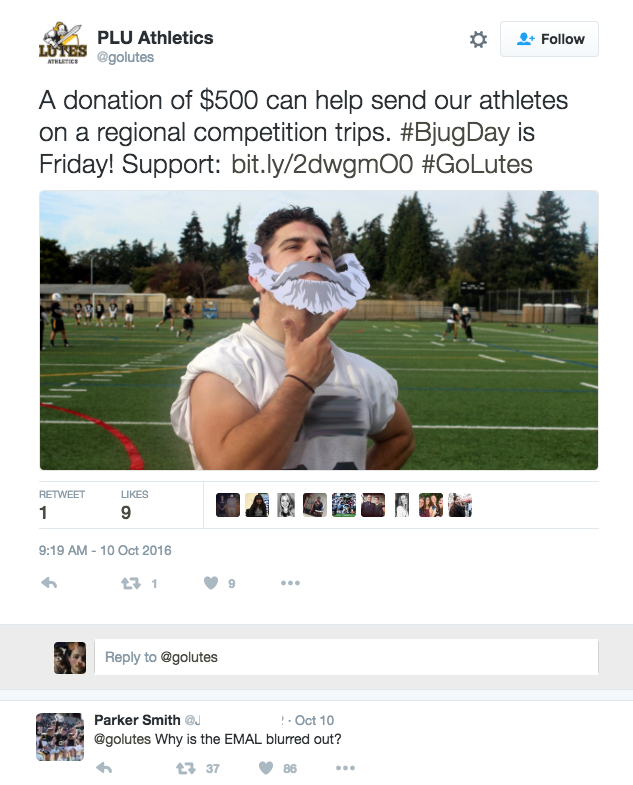
This picture of junior Mark Gallant, running back, featuring a visibly blurred spot where EMAL is written, was tweeted Oct. 10 to @GoLutes. It has one retweet and nine likes. Senior Parker Smith’s response, “Why is EMAL blurred out?” has 37 retweets and 86 likes.
The jersey featured a large, blurry streak where the acronym EMAL was printed.
Senior Parker Smith commented first, asking, “Why is the EMAL blurred out?” His response earned 37 retweets and 86 likes and called attention to Athletics’ practice of excluding EMAL from official communications.
As a PLU football legacy, EMAL has been an essential aspect of the football team’s philosophy for decades. Recently, EMAL has come under fire: while EMAL is a longstanding tradition that promotes unity and selflessness, some argue that the acronym is exclusionary and outdated.
THE LEGACY
EMAL, an acronym for Every Man A Lute, persists as a dominant ideology in PLU football. It stresses the importance of unity and support within the team.
Former Head Coach Forrest “Frosty” Westering, who arrived in 1972, created the term. He utilized its philosophy for 30 years until his retirement in 2003.
During his career, Frosty presided as the ninth winningest coach in college football, and “no PLU team under Frosty’s guidance suffered a losing season,” according to Frosty’s biography on GoLutes.
In that time, EMAL worked to uplift PLU football as one of the best programs in the NCAA Division III and Frosty as one of the best coaches.
Many past students, faculty and fans cited EMAL as the reason for the team’s success.
In 1999, then-PLU student Ronald
Rasmus wrote his Master of Arts in Education thesis about EMAL.
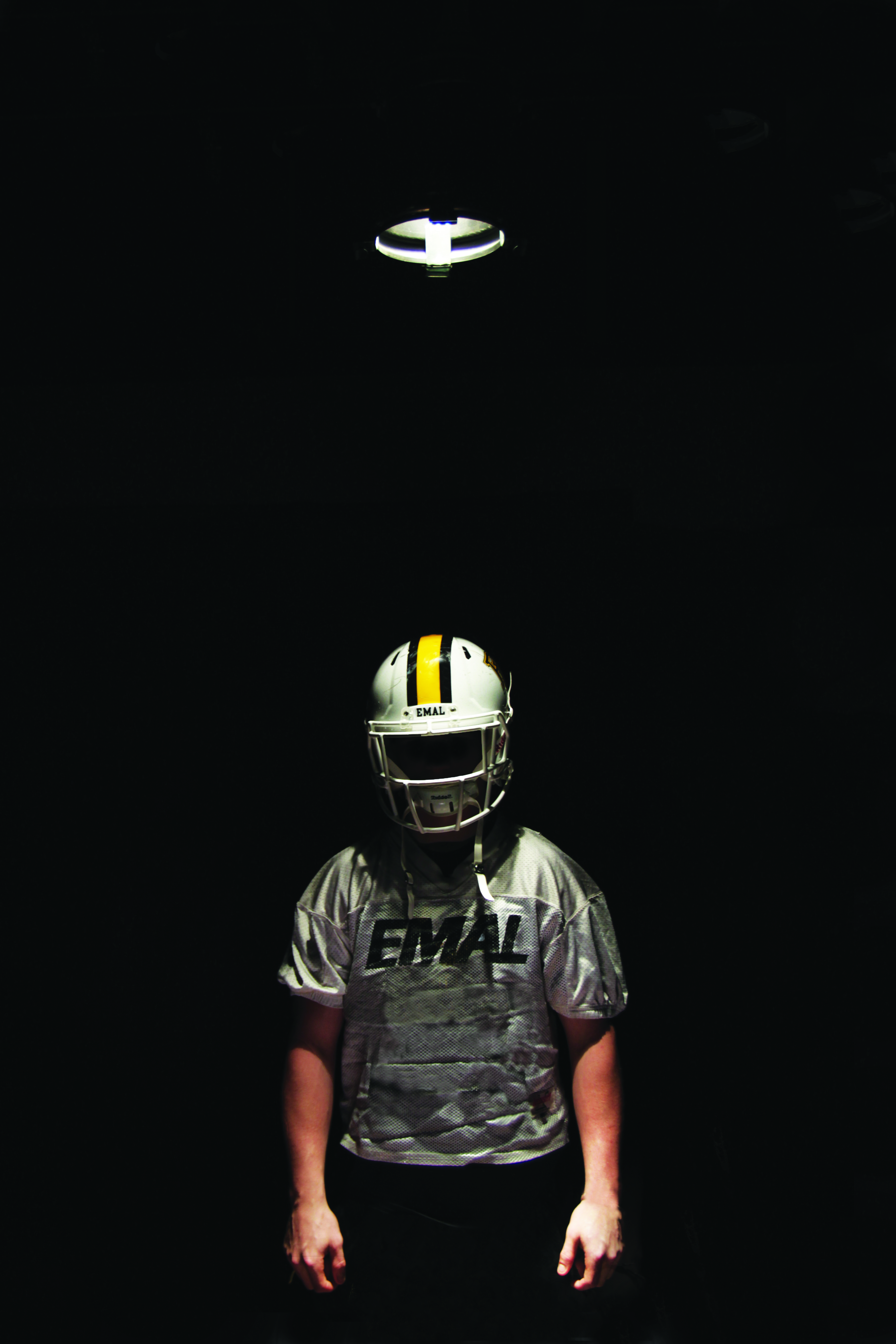 The application of EMAL, Rasmus noted, included a handbook given to each player at the start of the season that contained “voluminous handouts that pertain mainly to [EMAL’s] ‘Inner Game’ of psychological and spiritual training.” The handouts reflected Frosty’s commitment to building character through coaching.
The application of EMAL, Rasmus noted, included a handbook given to each player at the start of the season that contained “voluminous handouts that pertain mainly to [EMAL’s] ‘Inner Game’ of psychological and spiritual training.” The handouts reflected Frosty’s commitment to building character through coaching.
When Amanda Feller, Associate Professor of Communication, began working at PLU about 17 years ago, campus culture embraced EMAL.
EMAL was part of popular PLU jargon at that time — she said the term was so heavily used at PLU that students picked up the term after only a few weeks on campus.
Feller said students, faculty and staff knew EMAL’s purpose fairly well. She said Frosty utilized EMAL to teach his players how to be stand-up men in their communities, which required community service on campus and beyond.
This commitment to service, Feller said, lent to an openness and generosity surrounding EMAL’s philosophy.
“It didn’t end up as a closed fraternity, like you could only belong if you knew the secret handshake,” she said.
Instead, EMAL represented a system focused on building good character, a system widely accepted and praised by the PLU community.
Scott Westering, the current head coach and Frosty’s son, described EMAL as a familial legacy.
“All I ever knew my dad to be was a college football coach,” he said.
“For us, the idea of Every Man a Lute means we’re all in. We’re buying into each other,” Scott Westering said. “We’re learning to believe and trust in each other — to develop belief in the system, the coaches, what we’re doing and how we’re doing it.”
Scott Westering described EMAL as a signifier of brotherhood for PLU football players. It ties together and bonds current and past members of the team, he said.
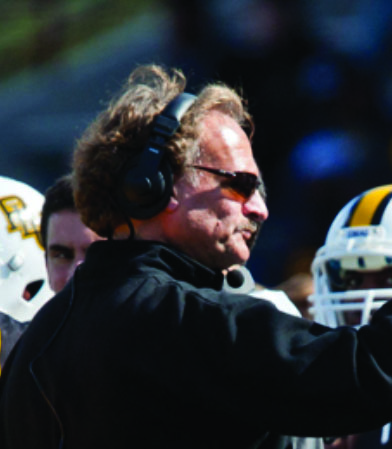
-Coach Scott Westering
“At the end of the day, EMAL is at the core of PLU football,” he said. “It’s what my father [established], and we have continued to use that as our focal point, our gathering point.”
EXCLUSIONARY LANGUAGE
EMAL has implications beyond its function as a code of ethics: some argue the phrase is inherently exclusionary.
Scott Westering contended that “man” holds no particular meaning in EMAL. The word functions as a casual identifier, much like the term “guys,” he said.
Professor of Communication Peter Ehrenhaus explained that when a male term like man or guys is used simply as a general descriptor, it employs masculinity as universal and renders femininity invisible.
“One could argue that the logic doesn’t explicitly exclude ‘Every Woman’ and that we’re all Lutes,” Ehrenhaus said. “But if that’s the case, then why even verbally assert that ‘Every Man’ is a Lute?”
Amy Young, Chair of Communication and Theatre, defined EMAL as a “spotlight term” that “continues to naturalize a hierarchy in athletics and in gender.”
Young spoke on the inequality between EMAL and its female counterpart, Lady Lutes. Lady Lutes, Young says, isn’t parallel to EMAL in its use of the word lady.
“They get to be men, and [female athletes] have to be ladies,” Young said.
President Thomas Krise said EMAL might not measure up to the university’s open-arms mission statement.
“Inclusivity is a big deal here,” Krise said. “It’s hard to carry out our mission statement if we are not deliberately trying to include everybody.”
Jen Childress-White, women’s basketball coach, argued that stripping “societal labels” can open the door to inclusivity.
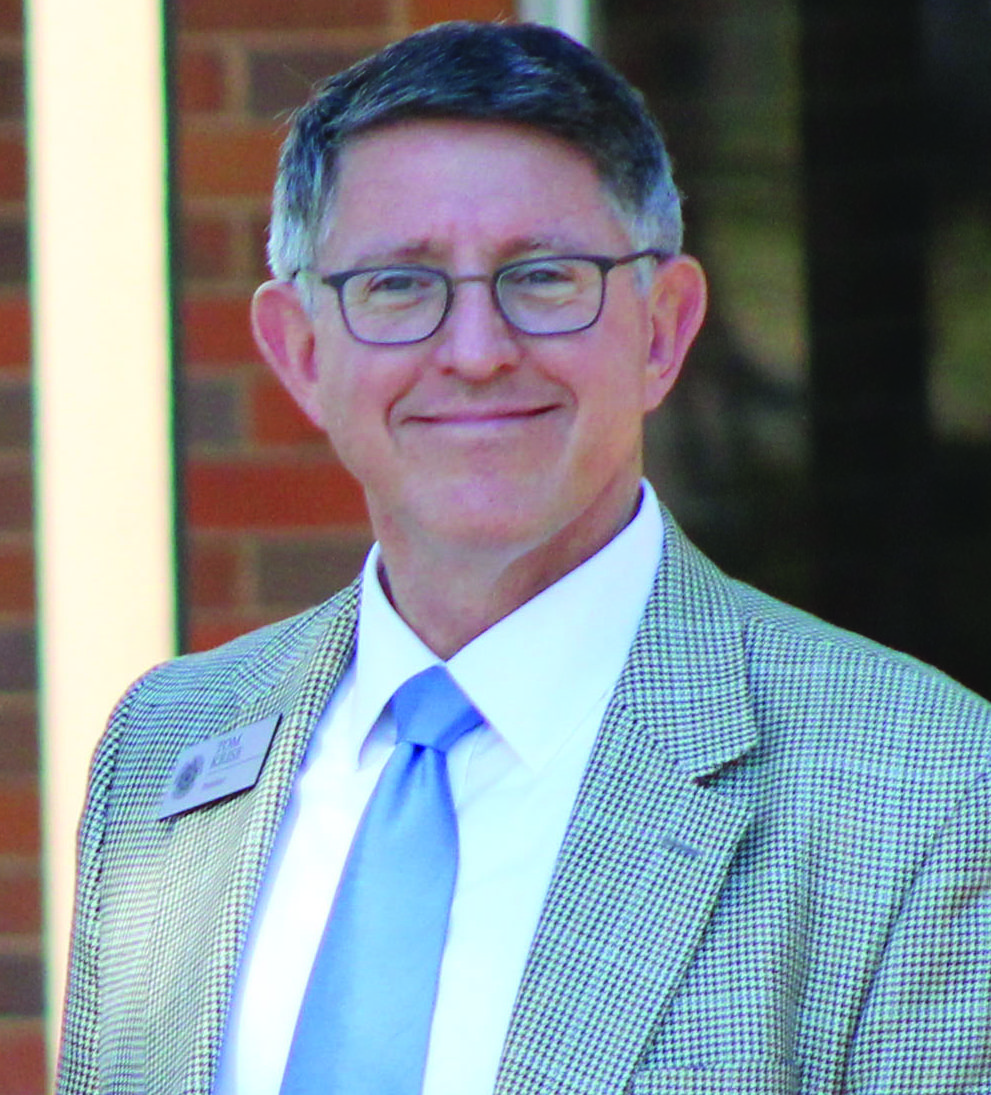
-President Thomas Krise
“To me inclusive language is looking at a human being as a human being,” Childress-White said. “It’s treating people as people.”
In the interest of supporting inclusivity in athletics, Feller proposed retiring EMAL in exchange for a “modern slogan with new meaning for a new era.” The challenge in that regard, Feller said, is finding a way to honor the legacy of EMAL while modernizing according to a new time and culture.
“We should attempt to honor [EMAL] — not erase it from history — but have something new going forward,” she said. “It was very powerful for the time, but let’s develop a new tradition.”
As a possible alternative, Krise proposed EPAL — Every Player A Lute. He said the gender exclusive language was “outdated.”
“If you have something that’s exclusively masculine, then it seems very obviously designed or has the effect of excluding people,” Krise said. “We’re trying to figure out how to be an inclusive society, so language is a big part on how people feel included or not.”
IN RESPONSE
PLU community members respond to EMAL in a variety of ways, spanning from criticism to strong defense.
Sophomore cross-country runner Brad Hodkinson said he doesn’t see any explicit issues with EMAL. He said he recognizes EMAL as a football-specific tradition.
“It’s their own thing. I don’t see anything wrong with it as long as it doesn’t interfere with anyone else,” he said. “I don’t see why anyone would get that upset about it.”

-Sophomore Brad Hodkinson
Former volleyball player Jennifer Henrichsen ‘07 said she remembers EMAL as a system that encouraged partnership and care.
“EMAL is a timeless philosophy that transcends notions of gender through its focus on teamwork and selflessness, and its connection to something bigger than oneself,” she said. “I didn’t think of EMAL as a particularly problematic or gendered concept when I attended PLU.”
When Troy Oppie ‘03 attended PLU, he worked with the student TV station to generate live coverage of football games.
“It represented the culture Frosty created, which as far as I’m concerned had zero to do with gender and everything to do with family and unity,” Oppie said. The slogan was “used to unite, not divide.”
“I’d hope they can understand its power as a unifier and not some exclusive label meant to solely lift up the male athletes,” Oppie said.
It is worthy of critical discussion, as long as the intent of the slogan was kept in mind, he said.
Junior Tegan Mitchell, President of PLU’s Feminist Student Union, feels EMAL acts as an exclusionary term. Even if exclusion is not EMAL’s intent, Mitchell says the slogan doesn’t work on a campus with an inclusive mission.
“[EMAL] perhaps can make anyone who doesn’t identify as male feel less of a sense of belonging, which we all know is really important in a college environment,” Mitchell said. “It needs to be a place that supports all people.”
ON THE BOOKS
On a departmental scale, Athletics officially limits its branding to the terms PLU, Pacific Lutheran University and Lutes. Laurie Turner, Director of Athletics and Recreation, said the Athletics department aims to be consistent with its branding. Therefore, athletes should be branded using PLU and Lutes.
“I’m firm on not letting the football program — or any program — to self-identify different than what our brand is,” Turner said.
Official communication from Athletics thus excludes EMAL and Lady Lutes. This includes cropping and editing photos of players, as exhibited in the department’s Bjug Day tweet.
The exclusion of EMAL from official Athletics communications is nothing new, said Director of Athletic Communications Mark Albanese. The Athletics department, to Albanese’s knowledge, never used EMAL or Lady Lutes in official communications on social media or PLU’s website.
Albanese stressed this practice as marketing strategy, not an attack on EMAL or slogans like it.
!["Perhaps [EMAL] is not unifying in the same way anymore." -Athletics Director Laurie Turner](https://mastmedia.plu.edu/wp-content/uploads/2016/11/Laurie-e1478218819240.jpg)
-Athletics Director Laurie Turner
“We’re not trying to eliminate EMAL. That has never been the intent,” he said. “We just need to be very sensitive about the language we use, especially when trying to sell this as a great institution that is open and accepting to people.”
Turner, on the other hand, recognized the issues that EMAL poses in terms of language and gender beyond marketing reasons.
“My philosophy is, if it’s good for you, then it needs to be good for [everyone],” Turner said. “We need to have policies and procedures in place that serve everyone.”
“Perhaps [EMAL] is not unifying in the same way anymore. [Inclusivity] is an ongoing education and challenge,” she said.
PUT INTO PRACTICE
Scott Westering suggested the team’s perception when viewing the manipulated photo on Twitter was just “one of our football guys in his practice jersey” with the “legacy building block” of EMAL completely obscured.
He said he met with his team and discussed why the athletic department excludes EMAL in their marketing, such as the Bjug Day tweet.
“Having that meeting and talking it through was letting them know: ‘It is what it is, and now we have a choice,’” he said. “Now we can move forward because we’ve become educated about the situation.”
Achieving equity could require questioning tradition, said Joanna Royce-Davis, Vice President of Student Life.
“When someone who is female-identified chooses to participate in football — such as last year — then [EMAL] is not inclusive of that person,” Royce-Davis said, in reference to Annika Smith-Ortiz, who was PLU’s first female footballer in Fall 2015. “The reality is, language does matter. [It] requires intentional attention.”
“I think we can recognize EMAL as a source of affinity while simultaneously challenging how well it serves the whole,” Royce-Davis said. “It’s a challenge to figure out how we stay connected and honor a history, [while] recognizing that it might not resonate the same way as sports changes.”
Reporting was led by Brooke Thames. Additional interviews were conducted by Rhiannon Berg and Courtney Miranda. Matthew Salzano, Paris Franklin, Christian Bond, Morgan Stark, Breanna Wiersma and Hannah Soltis were also significant contributors.
















